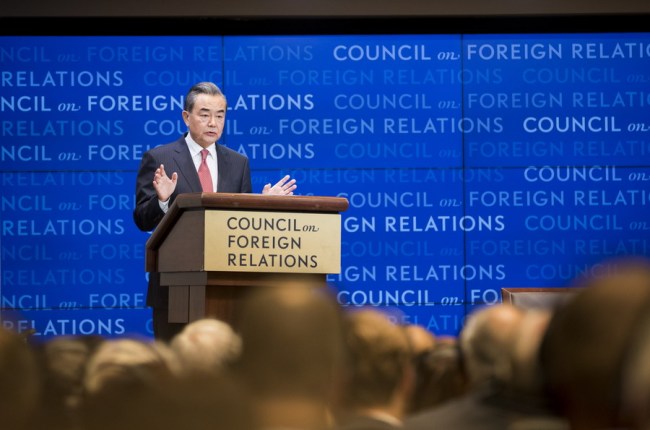


Chinese State Councilor and Foreign Minister Wang Yi speaks while meeting with Richard Haas, president of Council on Foreign Relations, a New York-based think tank, as well as other members of the council on Friday, September 28, 2018. [Photo: fmprc.gov.cn]
NEW YORK, Sept. 28 (Xinhua) -- Chinese State Councilor and Foreign Minister Wang Yi on Friday warned against the rising negative sentiment towards China in the United States.
"Many people who are committed to maintaining and promoting China-U.S. relations feel the cold wind blowing from behind, which should arouse the attention and vigilance of both sides," he said while meeting with Richard Haas, president of Council on Foreign Relations, a New York-based think tank, as well as other members of the council.
He listed a few basic numbers to refute the claim by some people that the United States has suffered a huge loss in its economic and trade exchanges with China.
"In 2017, every U.S. farmer exported an average of more than 10,000 dollars of agricultural products to China; GM sells 4 million vehicles every year in China, exceeding its sales in the United States over the same period; in 2016, U.S.-owned enterprises achieved sales of over 600 billion dollars in the Chinese market. Now (they sell) definitely even more," he said.
Wang said some people in the United States have accused China of rolling back its opening-up policy, and this is groundless.
President Xi Jinping has repeatedly stated clearly that China will not its door to the world and will expand its opening, Wang said.
The top Chinese diplomat pointed to the fact that China has taken the lead among developing countries in terms of the speed and scope of its opening-up effort.
He cited China's opening-up in the service trade as an example. "The World Trade Organization (WTO) has set up more than 160 sub-sectors that need to be opened. The developed countries in average opened 108 of them, while China opened 100 of them, far exceeding developing countries' average of 54."
As for tariffs, China's commitment to the WTO was to reduce the tariff to 10 percent and now it stands at 9.8 percent, Wang said, adding that the Chinese government has announced its decision to further reduce it to 7.5 percent as of Nov. 1.
Particularly, China's tariff on agricultural products only stands at 15 percent, much lower than the average rate of 39 percent in the developed countries, he pointed out.
With regard to foreign investment, he said China has been lowering the threshold for foreign investment and China's environment is increasingly favorable to foreign investment.
Wang said China has never forced U.S. companies to transfer technology. The truth is U.S. companies voluntarily signed contracts with their Chinese partners to transfer technologies in order to access the Chinese market and those U.S. companies have also charged fees for such transfers.
According to statistics, Chinese companies paid more than 28 billion dollars to foreign companies for the use of intellectual property last year, and in the first eight months this year, Chinese companies already paid 30 billion dollars for intellectual property, a large part of which went to the pockets of U.S. companies, said Wang.
He said it is unfair for U.S. companies to blame China when they not only gained market shares in China, but also made money through technology transfers.
Wang also reiterated China's stance on issues including the situation on the Korean Peninsula and in the South China Sea.

 Award-winning photos show poverty reduction achievements in NE China's Jilin province
Award-winning photos show poverty reduction achievements in NE China's Jilin province People dance to greet advent of New Year in Ameiqituo Town, Guizhou
People dance to greet advent of New Year in Ameiqituo Town, Guizhou Fire brigade in Shanghai holds group wedding
Fire brigade in Shanghai holds group wedding Tourists enjoy ice sculptures in Datan Town, north China
Tourists enjoy ice sculptures in Datan Town, north China Sunset scenery of Dayan Pagoda in Xi'an
Sunset scenery of Dayan Pagoda in Xi'an Tourists have fun at scenic spot in Nanlong Town, NW China
Tourists have fun at scenic spot in Nanlong Town, NW China Harbin attracts tourists by making best use of ice in winter
Harbin attracts tourists by making best use of ice in winter In pics: FIS Alpine Ski Women's World Cup Slalom
In pics: FIS Alpine Ski Women's World Cup Slalom Black-necked cranes rest at reservoir in Lhunzhub County, Lhasa
Black-necked cranes rest at reservoir in Lhunzhub County, Lhasa China's FAST telescope will be available to foreign scientists in April
China's FAST telescope will be available to foreign scientists in April